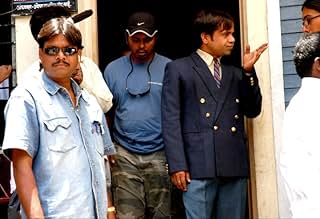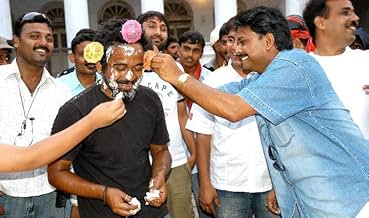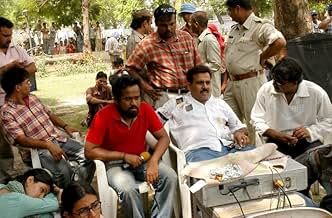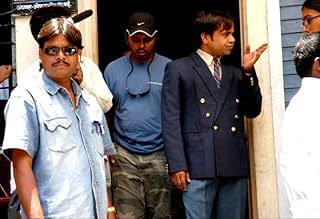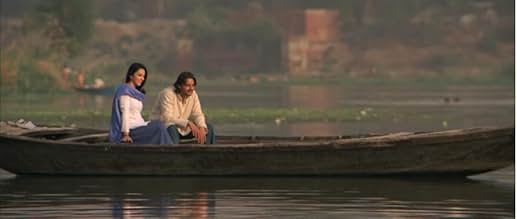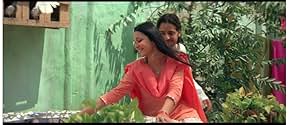Anwar
- 2007
- 2h 24min
CALIFICACIÓN DE IMDb
6.5/10
1.2 k
TU CALIFICACIÓN
Agrega una trama en tu idiomaAnwar, a middle-class Muslim, falls in love with Mehru, his next-door neighbour. Post her death, he is caught by the police, and a misunderstanding leads them to believe that he is a terrori... Leer todoAnwar, a middle-class Muslim, falls in love with Mehru, his next-door neighbour. Post her death, he is caught by the police, and a misunderstanding leads them to believe that he is a terrorist.Anwar, a middle-class Muslim, falls in love with Mehru, his next-door neighbour. Post her death, he is caught by the police, and a misunderstanding leads them to believe that he is a terrorist.
- Dirección
- Guionistas
- Elenco
Rajpal Naurang Yadav
- Gopinath
- (as Rajpal Yadav)
Surya Dwivedi
- Villain
- (solo créditos)
- Dirección
- Guionistas
- Todo el elenco y el equipo
- Producción, taquilla y más en IMDbPro
Opiniones destacadas
10saima1
I remember many years ago someone told me about this movie. That it was very simple and the one to watch. So I began watching it and didn't really connect to it and switched it off. However, recently I heard one of the songs again and thought let me see the reviews on here and immediately went off to re watch it. Words can't describe how amazing this movie is and I don't regret not having watched it earlier. When I first watched it I had hardly encountered any struggles in my life. I was subjected to the typical bs masala movies. After these few years it's only now that I have understood life and love. My weak mind wouldn't have understood Anwar's pain and love back then. I loved all the actors - tremendous job! Totally unbiased and it should be classed as one of the finest Indian movies ever.
The movie starts brilliantly, with excellent visuals giving us glimpses of colourful photographic images. Then after the opening credits, we see a young Anwar (Siddharth Koirala) travelling buy bus. He decides to stop at Dholpur and spends the night in a temple. In the morning he is awakened by voices. A minister makes an announcement about a terrorist hiding in the temple. Gradually villagers, journalists, police and even filmmakers get involved in the gathering crowd.
Jha doesn't tell his story chronologically and that works because it keeps the viewer engaged and to keep focus on different characters and their stories. 'Anwar' is mainly Anwar's story but we also see several more broken or breaking love stories e.g. the minister and his ex-mistress, master Pasha, the reporter Anita, the cop and his dying wife and of course Anwar and Mehru. Don't people do some of the most irrational things when they have just experienced a severe heartbreak? Either they want to get back at the person who destroyed the relationship (Anwar), win back the lover (Anwar), project their anger towards something (or someone) else (the minister), preoccupy themselves with something else to not think about it (Manisha's character), or take drastic measures to end the pain immediately (Vijay Raaz's character).
At the same time we also see how many of these people are getting involved with the crowd around the temple, each one there for their own benefit e.g. the paranoid journalist (Rajpal Yadav) who thinks Bin Ladin is in there or the minister who sees this as a chance to win more votes. At first I thought that the Rajpal Yadav character was ridiculous but after re-watching the film, it made a lot more sense. During such (potential) crisis situations, isn't everyone wondering who's behind it? I mean nowadays when one hears of a bomb blast anywhere, the first name that comes to mind of the common people is Al Qaeda. Yadav's paranoid character actually believes that Bin Laden's hiding in the temple and this story will make him big.
The item number may seem pointless. However, the whole shooting in the temple location makes a lot of sense. It's good publicity for the filmmaker to shoot his film at the place and time of crisis. The item number presents the ridicule of the idea.
Jha's direction is superb and throughout the film we see images that symbolize something. Jha is telling us something through each of these images. I'll come back to this later on. The performances are equally excellent. Siddharth Koirala delivers one of the finest performances of the year. Nauheed Cyrusi is brilliant and Hiten Tejwani is good too. Vijay Raaz is a knockout. The rest of the cast are all adequate. The songs and background scores flow beautifully with the screenplay.
As I mentioned earlier, 'Anwar' is full of symbols. For example: Why were all the love stories broken/incomplete? What was Jha trying to convey about love in today's world? Did Anwar see his love for Mehru as Krishna's love for Radha? In one of the earlier images we see a blue earring fall into water, in a later scene we see Udit take off that earring from Mehru's ear. It was Anwar who had bought that ring for her. Why was that boy wearing a tri-colour shirt of the Indian flag? There are several ways to interpret.
This is one of the movies I'd love to further analyze and discuss but I'll just stop here for now. I do recommend people to watch this beautiful thought-provoking work of art even though I don't think it will appeal to everyone. If it doesn't appeal on first glance, try and give it another chance. It does get better with subsequent viewing.
Jha doesn't tell his story chronologically and that works because it keeps the viewer engaged and to keep focus on different characters and their stories. 'Anwar' is mainly Anwar's story but we also see several more broken or breaking love stories e.g. the minister and his ex-mistress, master Pasha, the reporter Anita, the cop and his dying wife and of course Anwar and Mehru. Don't people do some of the most irrational things when they have just experienced a severe heartbreak? Either they want to get back at the person who destroyed the relationship (Anwar), win back the lover (Anwar), project their anger towards something (or someone) else (the minister), preoccupy themselves with something else to not think about it (Manisha's character), or take drastic measures to end the pain immediately (Vijay Raaz's character).
At the same time we also see how many of these people are getting involved with the crowd around the temple, each one there for their own benefit e.g. the paranoid journalist (Rajpal Yadav) who thinks Bin Ladin is in there or the minister who sees this as a chance to win more votes. At first I thought that the Rajpal Yadav character was ridiculous but after re-watching the film, it made a lot more sense. During such (potential) crisis situations, isn't everyone wondering who's behind it? I mean nowadays when one hears of a bomb blast anywhere, the first name that comes to mind of the common people is Al Qaeda. Yadav's paranoid character actually believes that Bin Laden's hiding in the temple and this story will make him big.
The item number may seem pointless. However, the whole shooting in the temple location makes a lot of sense. It's good publicity for the filmmaker to shoot his film at the place and time of crisis. The item number presents the ridicule of the idea.
Jha's direction is superb and throughout the film we see images that symbolize something. Jha is telling us something through each of these images. I'll come back to this later on. The performances are equally excellent. Siddharth Koirala delivers one of the finest performances of the year. Nauheed Cyrusi is brilliant and Hiten Tejwani is good too. Vijay Raaz is a knockout. The rest of the cast are all adequate. The songs and background scores flow beautifully with the screenplay.
As I mentioned earlier, 'Anwar' is full of symbols. For example: Why were all the love stories broken/incomplete? What was Jha trying to convey about love in today's world? Did Anwar see his love for Mehru as Krishna's love for Radha? In one of the earlier images we see a blue earring fall into water, in a later scene we see Udit take off that earring from Mehru's ear. It was Anwar who had bought that ring for her. Why was that boy wearing a tri-colour shirt of the Indian flag? There are several ways to interpret.
This is one of the movies I'd love to further analyze and discuss but I'll just stop here for now. I do recommend people to watch this beautiful thought-provoking work of art even though I don't think it will appeal to everyone. If it doesn't appeal on first glance, try and give it another chance. It does get better with subsequent viewing.
You watch a movie like Anwar and immediately you think to yourself: 'These are the sorts of movies India should be submitting to the Baftas and the Oscars', and Manish Jha delivers this incredible story note-perfectly. Anwar is, at heart, a love story and unfolds to reveal its subject in its broadest sense: (love of one's career, love - or lack of love - for one's country etc.) and also captures the true spectrum of love: the blissful awakenings, the pleasure, the joy and the rejections, refusals and slow breaking of hearts. Stunning visuals combine with a cast of characters so brilliantly conceived one could almost find them in the pages of a novel by Vikram Seth and along with deft performances, editing and dialogue, present one of the finest films to come out of Hindi cinema. Anwar (the film) is thought-provoking, questioning, unhappy, longing, haunting and fundamentally achieves what we need cinema (from time to time, at least) to be: the sort of medium that shakes us from our slumber with explosions and loud shouts, demanding us to listen, to have our ideas and beliefs challenged and queried. I can't recommend it highly enough.
The only good thing in this movie is the song 'Maula Mere Maula' and the Concept/Idea. The making, direction, acting are all trash.
The movie starts with a lot of promise, but it fails to live up to the start. The excellent cinematography is spoiled by some loose performances and poor storyline. It seems that a 'short story' has been elongated too far. The movie still manages to remain with the viewer, even after a long time of watching it. The scenes in slow motion of the peacock feather, the blood in water, the blue earrings, the chase by Krishna are exquisite and haunting. The background music and the songs are also quite nice. What troubles the most is the poor performance of actors like Rajpal Yadav and Pankaj Jha not actually making an impact. Manisha Koirala too does a dumb Barkha Dutt parody. Manish Jha leaves a lot to be desired but also brings the hope of a different powerful 'statement oriented' cinema. I really wish if he could look at the other side of India and Indians for his next movie. (Reviewed on 14 February 2007)
¿Sabías que…?
- TriviaRelaunch of Manisha Koirala's brother, Siddharth Koirala.
- Bandas sonorasMaula Mere Maula
Written by Sayeed Qadri
Composed by Mithun Sharma
Performed by Roop Kumar Rathod
Courtesy of Saregama HMV
Selecciones populares
Inicia sesión para calificar y agrega a la lista de videos para obtener recomendaciones personalizadas
- How long is Anwar?Con tecnología de Alexa
Detalles
Taquilla
- Total a nivel mundial
- USD 53,256
- Tiempo de ejecución
- 2h 24min(144 min)
- Color
Contribuir a esta página
Sugiere una edición o agrega el contenido que falta

